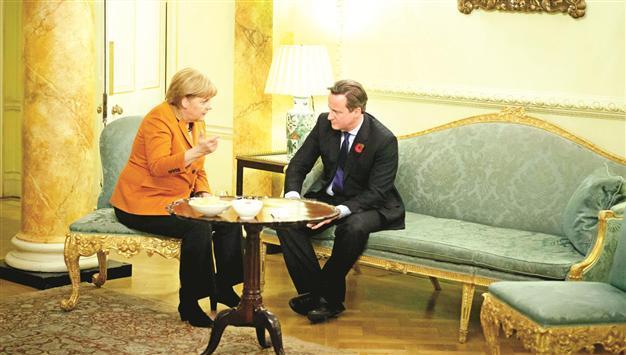Stay in bloc, European Union, Washington tell reluctant UK
DUBLIN / LONDON

Britain’s PM Cameron (R) and German Chancellor Merkel speak at the start of their meeting at Downing Street in this Novemeber 2012 photo. EU is in intense effort not to let out UK from the bloc. REUTERS photo
Keeping Britain in the EU is important, European leaders said Jan. 9, but added that they opposed treaty changes demanded by Prime Minister David Cameron.“Britain is an essential part of the EU,” Irish Prime Minister Enda Kenny said during a conference in Dublin that marked the beginning of his country’s six-month presidency of the bloc. “Great Britain has great value and is a very important member of the EU,” added EU President Herman Van Rompuy. The two leaders highlighted the importance of the union for British businesses, saying it was essential for them that Britain remained a full and active member. A majority of Britons favor severing all ties with the union, according to polls, and Cameron is expected to deliver a speech within the next few days spelling out his views on the country’s relationship with Brussels.
He insisted last year that he supported Britain’s membership, but that he wanted to negotiate a “new agreement” which would allow it to opt out of certain directives. Kenny and Van Rompuy both repeated their opposition to any treaty changes. “I don’t see a reopening of the treaties, I don’t see an issue in treaty change for any individual countries,” said the Irish prime minister. Irish Deputy Prime Minister Eamon Gilmore said the top concern of European citizens, “whether from Liverpool or Limerick,” was unemployment.
US seeks strong UK voice
Van Rompuy reiterated that it would be possible to change the treaties after the 2014 European elections, but added that he strongly supported deeper EU integration as opposed to an “a la carte” union. Van Rompuy previously said Cameron’s attempts to win back powers from the European Union could cause the bloc to fall apart. The top leaders’ comments came as the U.S. expressed similar concerns about Britain’s plans to renegotiate its relationship with the EU, with a senior official saying Washington favors a “strong British voice” in Europe.
“We have a growing relationship with the EU as an institution, which has an increasing voice in the world, and we want to see a strong British voice in that EU,” Philip H. Gordon, assistant secretary of state for European and Eurasian affairs, told reporters at a briefing in London. “That is in America’s interests,” he said, according to two journalists present. “More than most others, its [Britain’s] voice within the European Union is essential and critical to the United States.”
Britain’s fraught relations with Europe have climbed to the top of the political agenda in recent months, with rebellious anti-EU members of Cameron’s ruling Conservatives demanding a new U.K. role inside the bloc or a referendum on whether Britain should leave altogether. Urging Britain and the EU to focus on issues such as growth and jobs rather than on the EU’s internal workings, Gordon said “referendums have often turned countries inward.”
“The more the EU reflects on its internal debate, the less it is able to be unified.”
Compiled from AFP and Reuters stories by the Daily News staff.
















